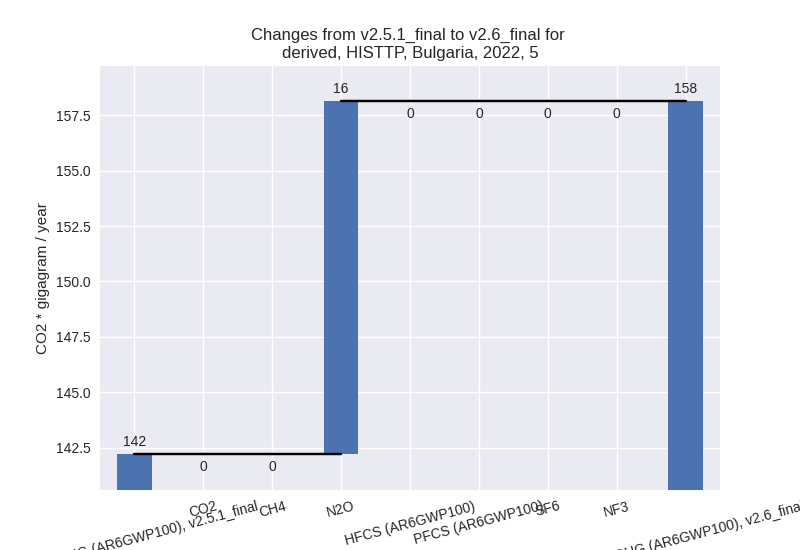Changes in PRIMAP-hist v2.6_final compared to v2.5.1_final for Bulgaria
2024-09-24
Johannes Gütschow
Change analysis for Bulgaria for PRIMAP-hist v2.6_final compared to v2.5.1_final
Overview over emissions by sector and gas
The following figures show the aggregate national total emissions excluding LULUCF AR6GWP100 for the country reported priority scenario. The dotted linesshow the v2.5.1_final data.
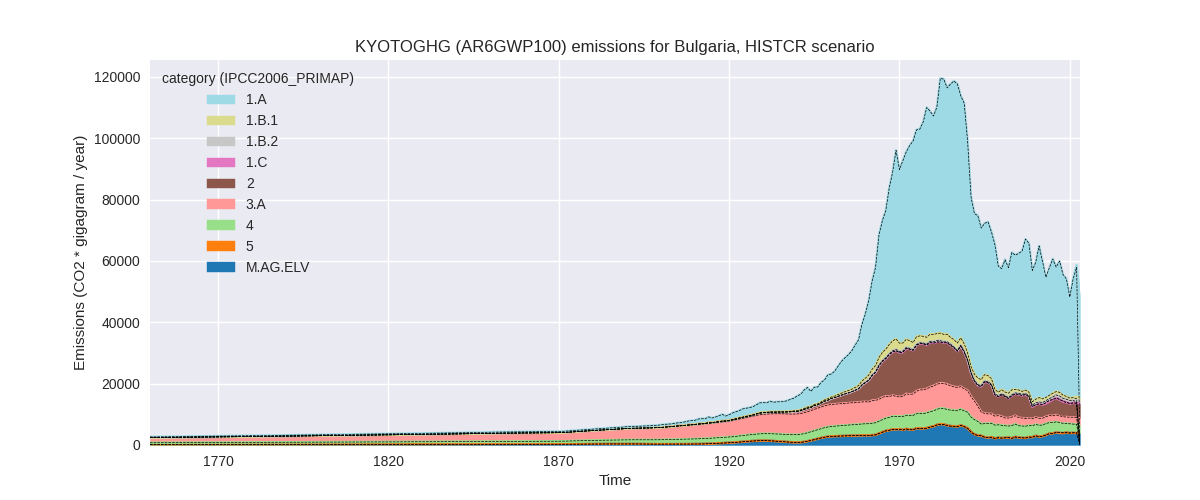
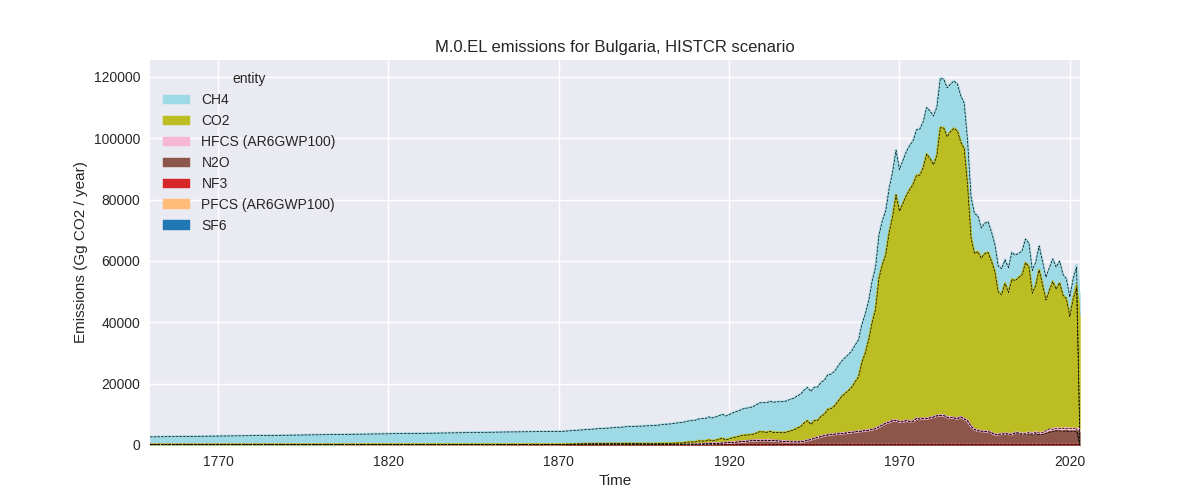
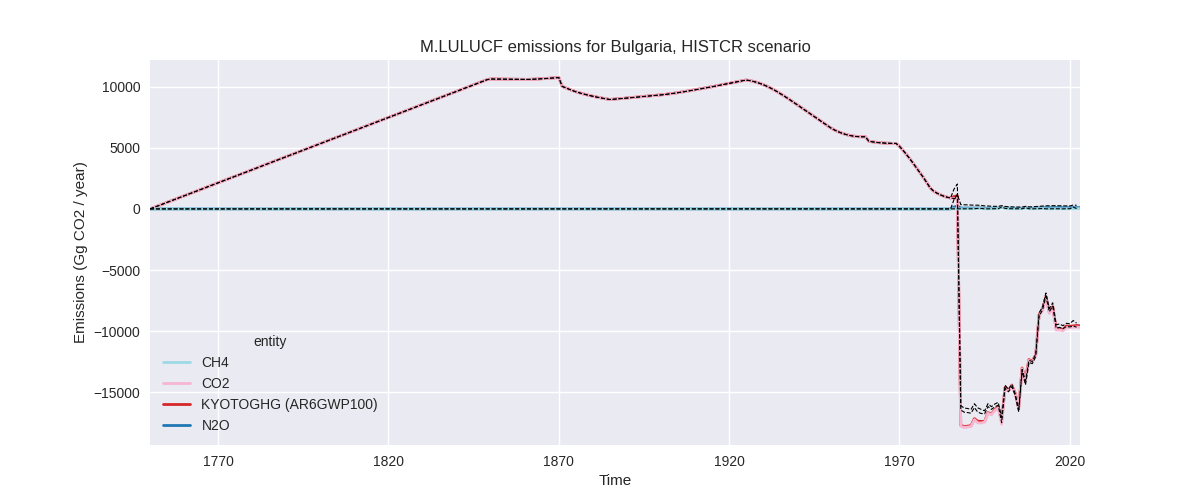
The following figures show the aggregate national total emissions excluding LULUCF AR6GWP100 for the third party priority scenario. The dotted linesshow the v2.5.1_final data.
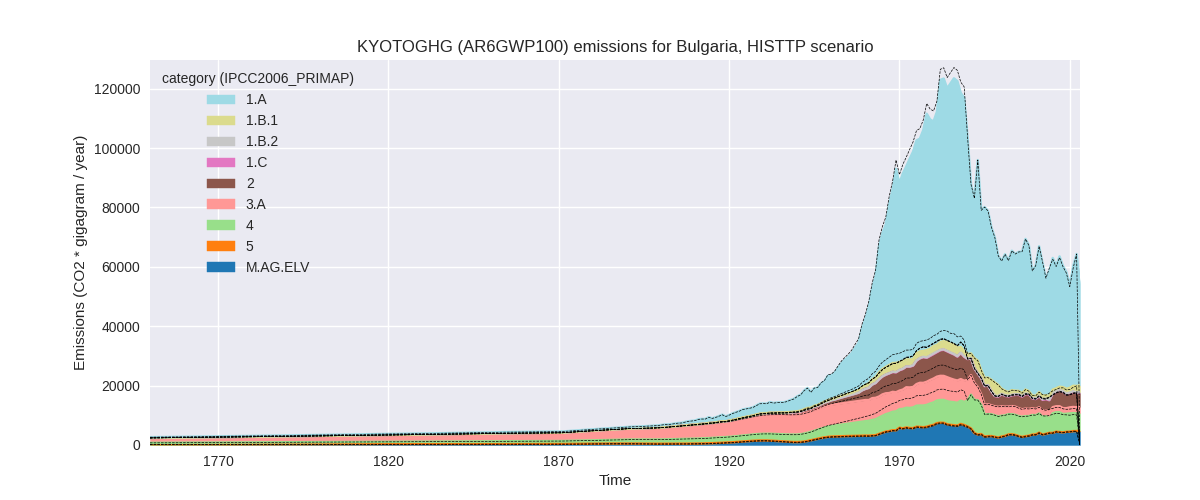
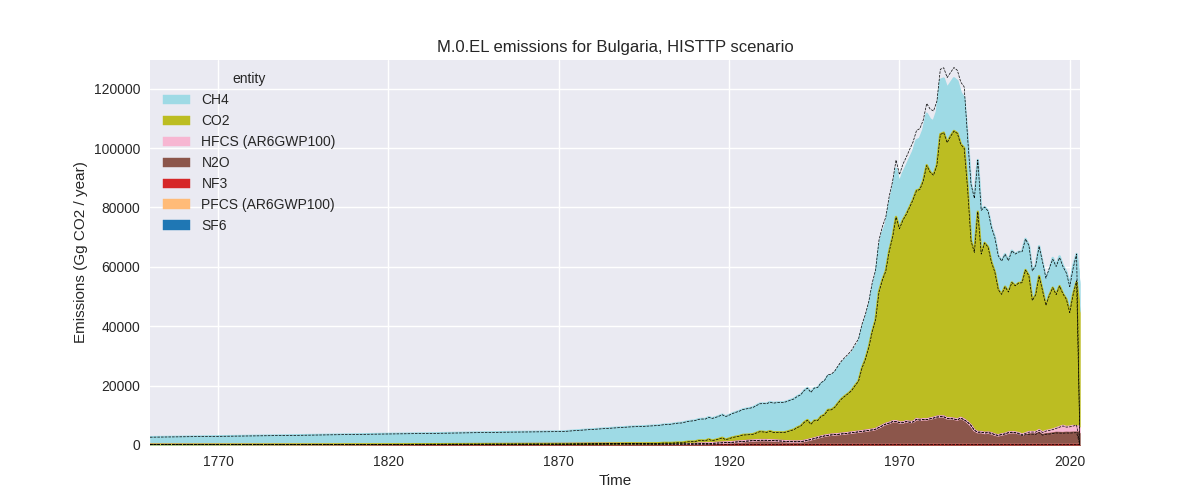
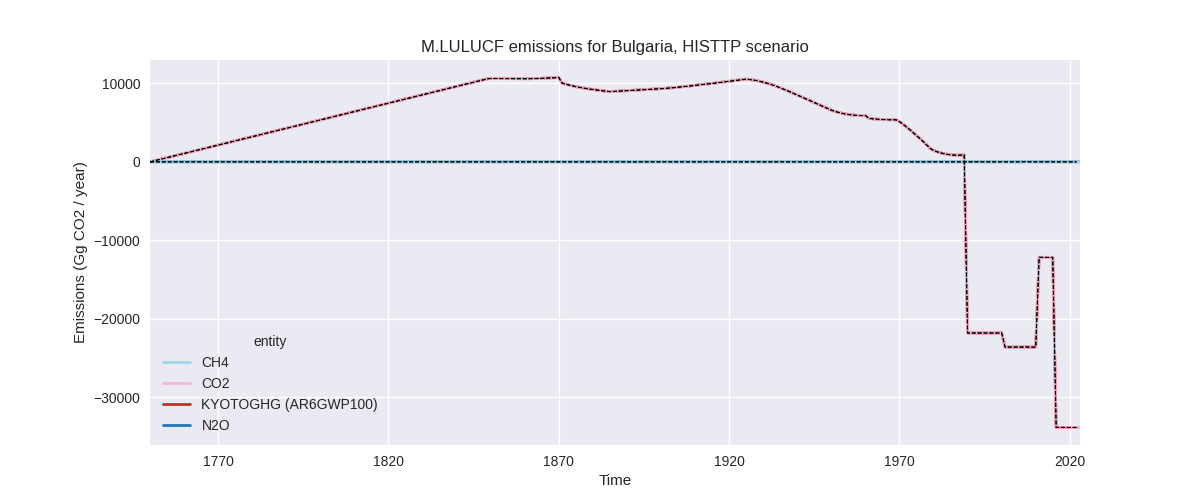
Overview over changes
In the country reported priority scenario we have the following changes for aggregate Kyoto GHG and national total emissions excluding LULUCF (M.0.EL):
- Emissions in 2022 have changed by 1.3%% (736.34 Gg CO2 / year)
- Emissions in 1990-2022 have changed by 0.1%% (33.03 Gg CO2 / year)
In the third party priority scenario we have the following changes for aggregate Kyoto GHG and national total emissions excluding LULUCF (M.0.EL):
- Emissions in 2022 have changed by -0.0%% (-4.82 Gg CO2 / year)
- Emissions in 1990-2022 have changed by 0.1%% (48.05 Gg CO2 / year)
Most important changes per scenario and time frame
In the country reported priority scenario the following sector-gas combinations have the highest absolute impact on national total KyotoGHG (AR6GWP100) emissions in 2022 (top 5):
- 1: 1.B.2, CO2 with 708.18 Gg CO2 / year (1614.8%)
- 2: 1.A, CO2 with 244.46 Gg CO2 / year (0.6%)
- 3: 2, CO2 with 138.31 Gg CO2 / year (3.8%)
- 4: M.AG.ELV, N2O with -117.34 Gg CO2 / year (-3.1%)
- 5: 1.A, CH4 with -79.25 Gg CO2 / year (-17.8%)
In the country reported priority scenario the following sector-gas combinations have the highest absolute impact on national total KyotoGHG (AR6GWP100) emissions in 1990-2022 (top 5):
- 1: 1.B.2, CO2 with 21.46 Gg CO2 / year (8.1%)
- 2: 2, HFCS (AR6GWP100) with -17.29 Gg CO2 / year (-4.5%)
- 3: 1.A, CO2 with 15.89 Gg CO2 / year (0.0%)
- 4: 2, CO2 with 13.86 Gg CO2 / year (0.3%)
- 5: 3.A, CH4 with -12.44 Gg CO2 / year (-0.4%)
In the third party priority scenario the following sector-gas combinations have the highest absolute impact on national total KyotoGHG (AR6GWP100) emissions in 2022 (top 5):
- 1: 2, HFCS (AR6GWP100) with -528.56 Gg CO2 / year (-20.6%)
- 2: 4, CH4 with 475.55 Gg CO2 / year (8.9%)
- 3: 1.A, CO2 with 19.65 Gg CO2 / year (0.0%)
- 4: 5, N2O with 15.93 Gg CO2 / year (11.2%)
- 5: 4, N2O with 14.03 Gg CO2 / year (14.5%)
In the third party priority scenario the following sector-gas combinations have the highest absolute impact on national total KyotoGHG (AR6GWP100) emissions in 1990-2022 (top 5):
- 1: 4, CH4 with 53.12 Gg CO2 / year (0.8%)
- 2: 2, HFCS (AR6GWP100) with -16.02 Gg CO2 / year (-2.2%)
- 3: 5, N2O with 3.99 Gg CO2 / year (1.9%)
- 4: 4, N2O with 3.84 Gg CO2 / year (3.4%)
- 5: 1.A, CO2 with 2.73 Gg CO2 / year (0.0%)
Notes on data changes
Here we list notes explaining important emissions changes for the country. ’' means that the following text only applies to the TP time series, while means that it only applies to the CR scenario. Otherwise the note applies to both scenarios.
- 1.B.2, CO2 is much higher in 2022 because of a scaling problem in v2.5.1 (EDGAR 8.0 data is almost zero). this also affects cumulative emissions. (CR)
- Cement CO2 is higher in 2022 due to a rise in emissions not modeled by the Andrew cement data used in v2.5.1 (CR)
- Small changes to N2O from agriculture without livestock due to changes from CRF2023 to EEA2024 (CR)
Changes by sector and gas
For each scenario and time frame the changes are displayed for all individual sectors and all individual gases. In the sector plot we use aggregate Kyoto GHGs in AR6GWP100. In the gas plot we usenational total emissions without LULUCF. ## country reported scenario
2022
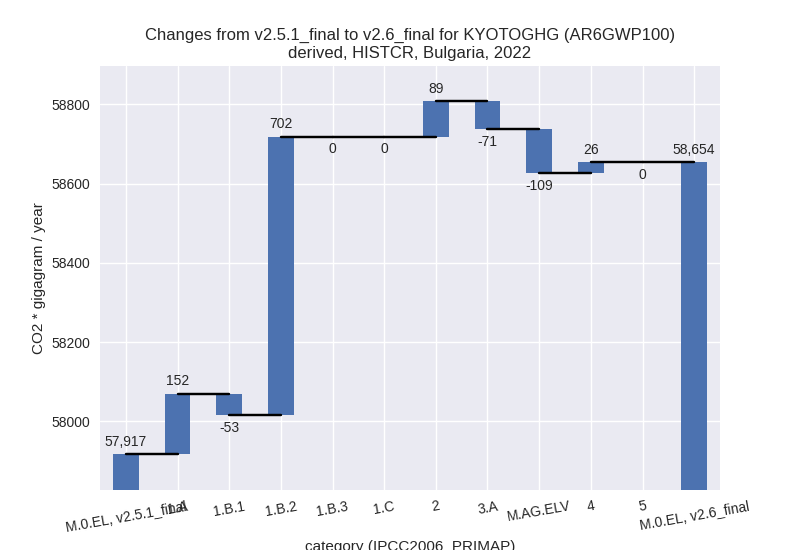
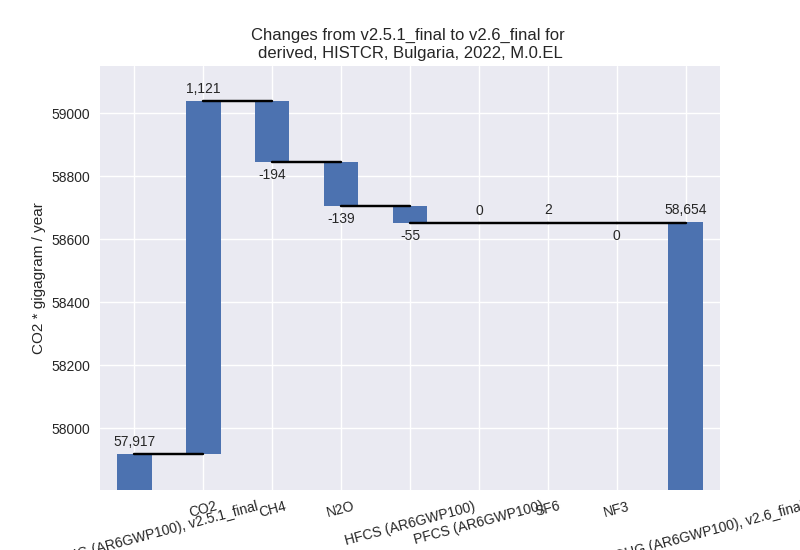
1990-2022
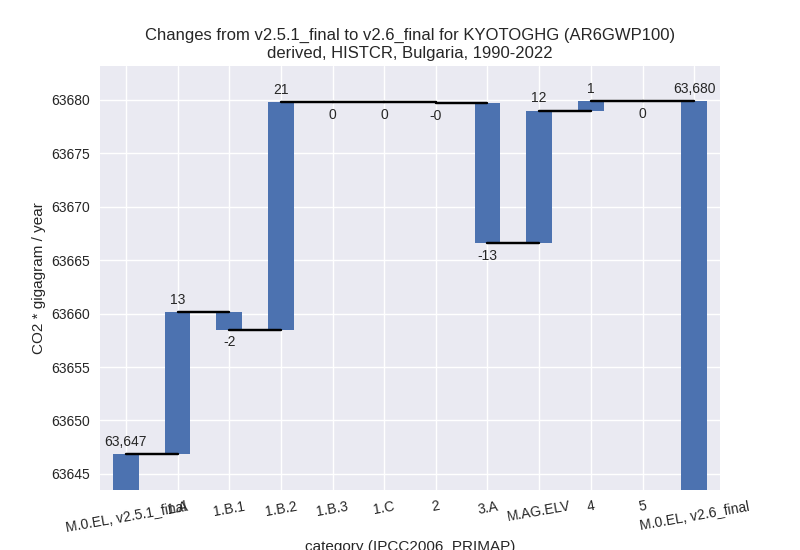
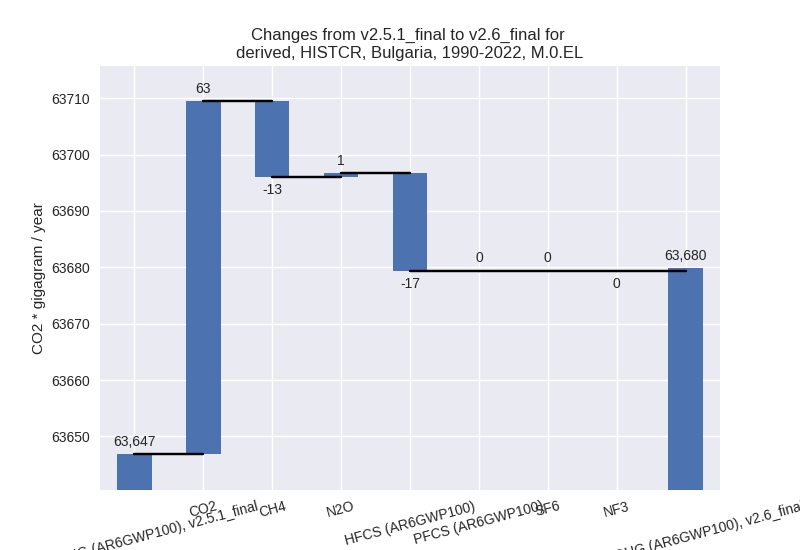
third party scenario
2022
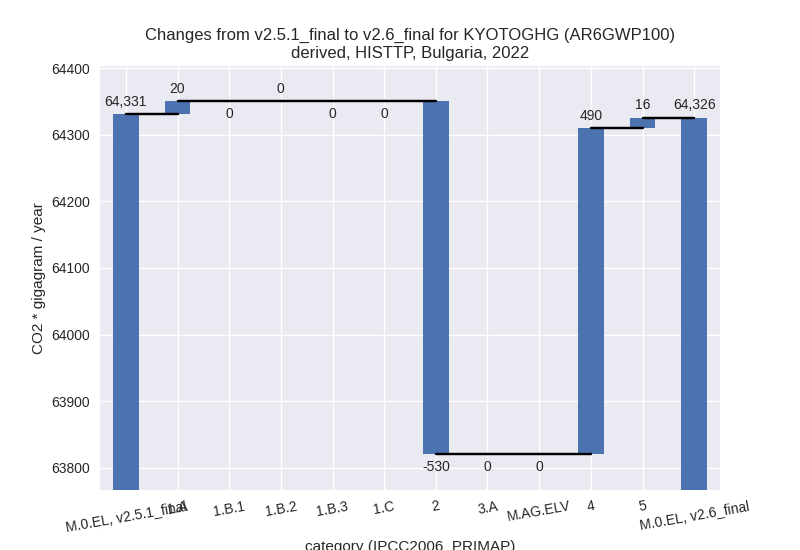
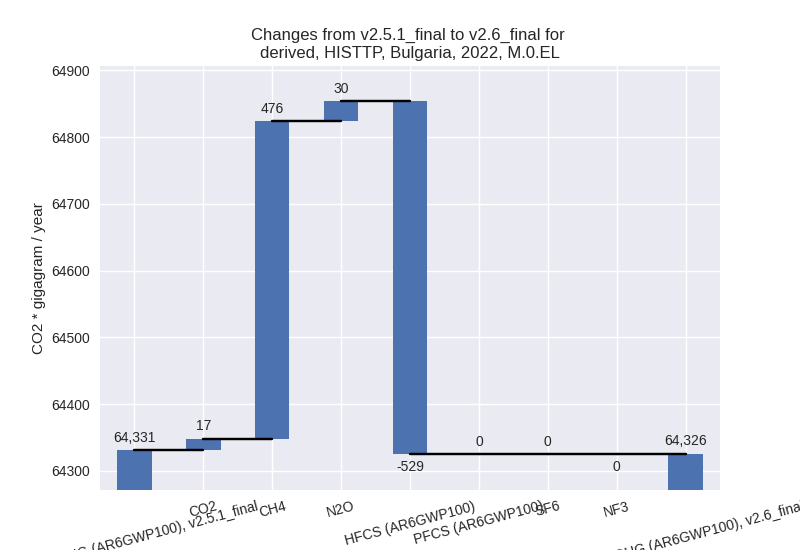
1990-2022
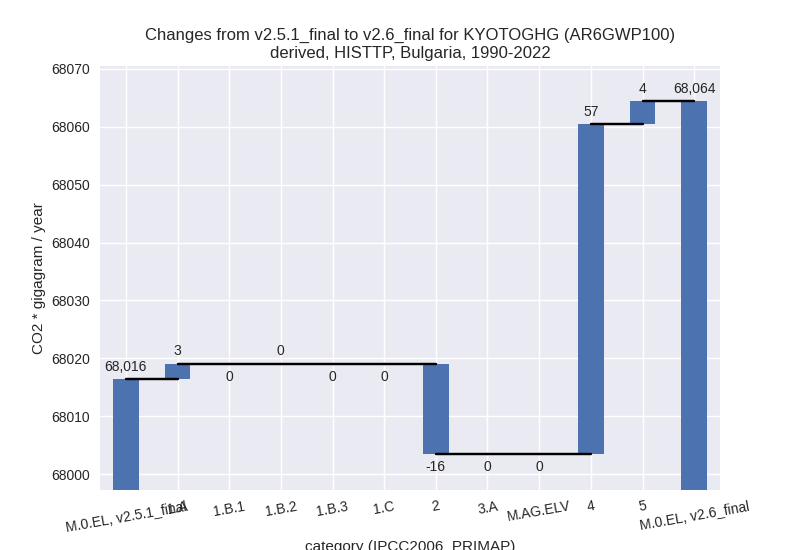
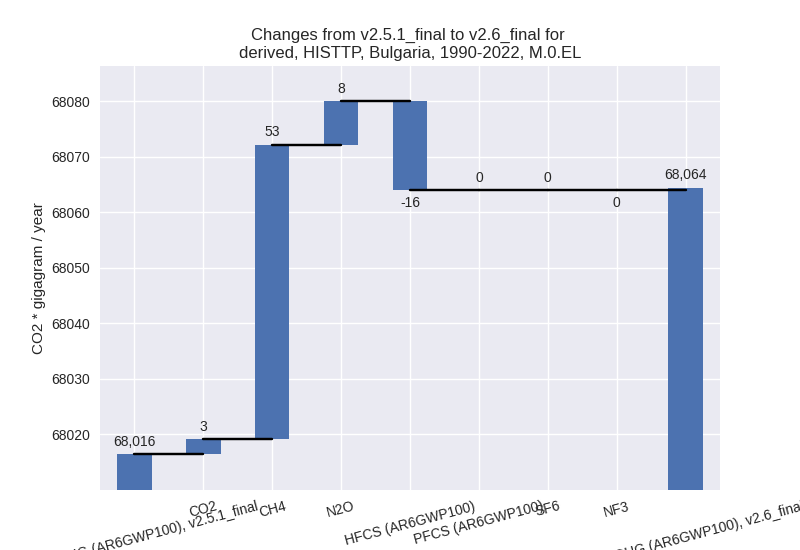
Detailed changes for the scenarios:
country reported scenario (HISTCR):
Most important changes per time frame
For 2022 the following sector-gas combinations have the highest absolute impact on national total KyotoGHG (AR6GWP100) emissions in 2022 (top 5):
- 1: 1.B.2, CO2 with 708.18 Gg CO2 / year (1614.8%)
- 2: 1.A, CO2 with 244.46 Gg CO2 / year (0.6%)
- 3: 2, CO2 with 138.31 Gg CO2 / year (3.8%)
- 4: M.AG.ELV, N2O with -117.34 Gg CO2 / year (-3.1%)
- 5: 1.A, CH4 with -79.25 Gg CO2 / year (-17.8%)
For 1990-2022 the following sector-gas combinations have the highest absolute impact on national total KyotoGHG (AR6GWP100) emissions in 1990-2022 (top 5):
- 1: 1.B.2, CO2 with 21.46 Gg CO2 / year (8.1%)
- 2: 2, HFCS (AR6GWP100) with -17.29 Gg CO2 / year (-4.5%)
- 3: 1.A, CO2 with 15.89 Gg CO2 / year (0.0%)
- 4: 2, CO2 with 13.86 Gg CO2 / year (0.3%)
- 5: 3.A, CH4 with -12.44 Gg CO2 / year (-0.4%)
Changes in the main sectors for aggregate KyotoGHG (AR6GWP100) are
- 1: Total sectoral emissions in 2022 are 45097.86 Gg CO2 / year which is 76.9% of M.0.EL emissions. 2022 Emissions have changed by 1.8% (801.25 Gg CO2 / year). 1990-2022 Emissions have changed by 0.1% (32.95 Gg CO2 / year).
- 2: Total sectoral emissions in 2022 are 4706.46 Gg CO2 / year which is 8.0% of M.0.EL emissions. 2022 Emissions have changed by 1.9% (88.90 Gg CO2 / year). 1990-2022 Emissions have changed by -0.0% (-0.09 Gg CO2 / year).
- M.AG: Total sectoral emissions in 2022 are 6046.96
Gg CO2 / year which is 10.3% of M.0.EL emissions. 2022 Emissions have
changed by -2.9% (-180.02 Gg CO2 /
year). 1990-2022 Emissions have changed by -0.0% (-0.72 Gg CO2 / year). For 2022 the
changes per gas
are:
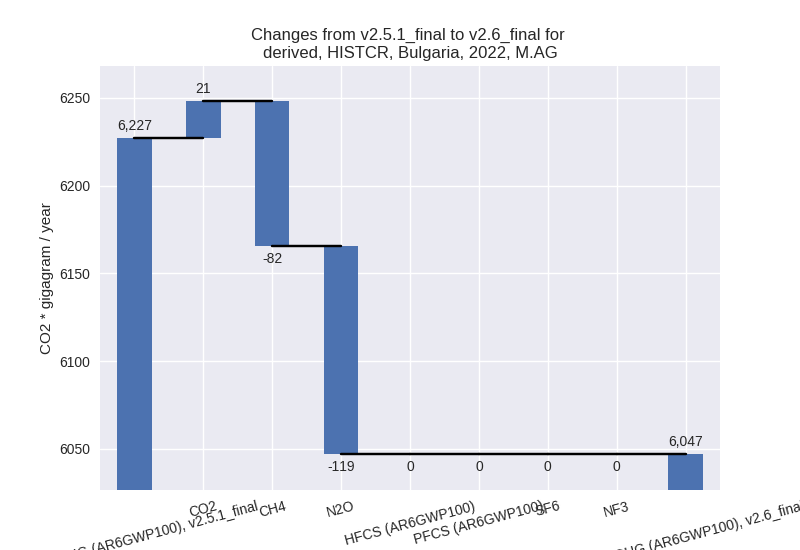
The changes come from the following subsectors:- 3.A: Total sectoral emissions in 2022 are 2184.89
Gg CO2 / year which is 36.1% of category M.AG emissions. 2022 Emissions
have changed by -3.1% (-70.96 Gg CO2
/ year). 1990-2022 Emissions have changed by -0.4% (-13.13 Gg CO2 / year). For 2022 the
changes per gas
are:
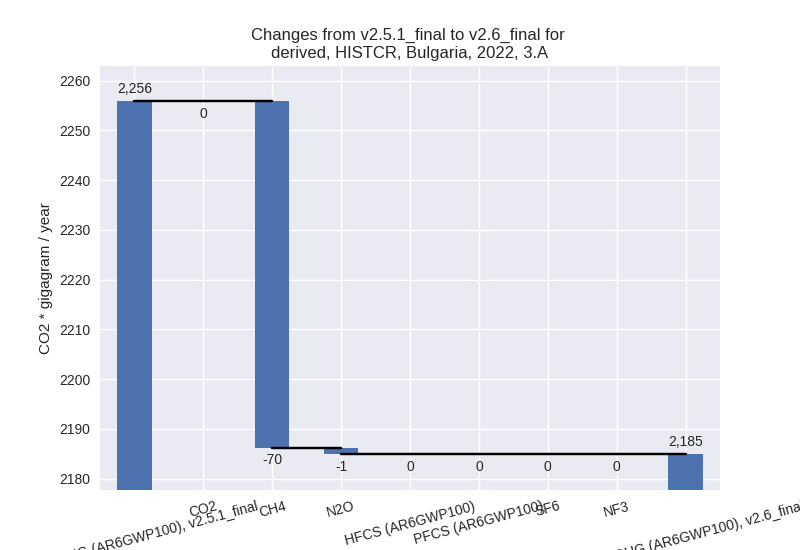
There is no subsector information available in PRIMAP-hist. - M.AG.ELV: Total sectoral emissions in 2022 are
3862.07 Gg CO2 / year which is 63.9% of category M.AG emissions. 2022
Emissions have changed by -2.7%
(-109.06 Gg CO2 / year). 1990-2022 Emissions have changed by 0.4% (12.41 Gg CO2 / year). For 2022 the
changes per gas
are:
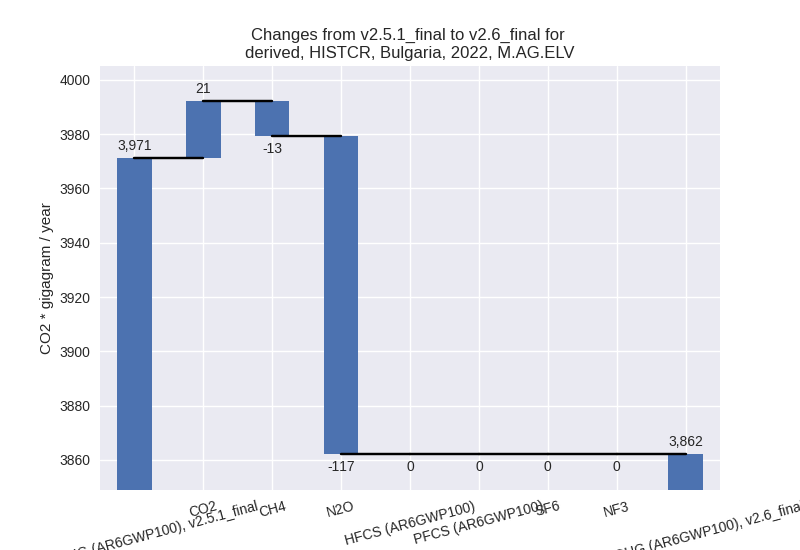
There is no subsector information available in PRIMAP-hist.
- 3.A: Total sectoral emissions in 2022 are 2184.89
Gg CO2 / year which is 36.1% of category M.AG emissions. 2022 Emissions
have changed by -3.1% (-70.96 Gg CO2
/ year). 1990-2022 Emissions have changed by -0.4% (-13.13 Gg CO2 / year). For 2022 the
changes per gas
are:
- 4: Total sectoral emissions in 2022 are 2802.39 Gg CO2 / year which is 4.8% of M.0.EL emissions. 2022 Emissions have changed by 0.9% (26.21 Gg CO2 / year). 1990-2022 Emissions have changed by 0.0% (0.89 Gg CO2 / year).
- 5: No data
third party scenario (HISTTP):
Most important changes per time frame
For 2022 the following sector-gas combinations have the highest absolute impact on national total KyotoGHG (AR6GWP100) emissions in 2022 (top 5):
- 1: 2, HFCS (AR6GWP100) with -528.56 Gg CO2 / year (-20.6%)
- 2: 4, CH4 with 475.55 Gg CO2 / year (8.9%)
- 3: 1.A, CO2 with 19.65 Gg CO2 / year (0.0%)
- 4: 5, N2O with 15.93 Gg CO2 / year (11.2%)
- 5: 4, N2O with 14.03 Gg CO2 / year (14.5%)
For 1990-2022 the following sector-gas combinations have the highest absolute impact on national total KyotoGHG (AR6GWP100) emissions in 1990-2022 (top 5):
- 1: 4, CH4 with 53.12 Gg CO2 / year (0.8%)
- 2: 2, HFCS (AR6GWP100) with -16.02 Gg CO2 / year (-2.2%)
- 3: 5, N2O with 3.99 Gg CO2 / year (1.9%)
- 4: 4, N2O with 3.84 Gg CO2 / year (3.4%)
- 5: 1.A, CO2 with 2.73 Gg CO2 / year (0.0%)
Changes in the main sectors for aggregate KyotoGHG (AR6GWP100) are
- 1: Total sectoral emissions in 2022 are 46832.94 Gg CO2 / year which is 72.8% of M.0.EL emissions. 2022 Emissions have changed by 0.0% (19.65 Gg CO2 / year). 1990-2022 Emissions have changed by 0.0% (2.73 Gg CO2 / year).
- 2: Total sectoral emissions in 2022 are 4775.96 Gg
CO2 / year which is 7.4% of M.0.EL emissions. 2022 Emissions have
changed by -10.0% (-530.10 Gg CO2 /
year). 1990-2022 Emissions have changed by -0.3% (-15.65 Gg CO2 / year). For 2022 the
changes per gas
are:
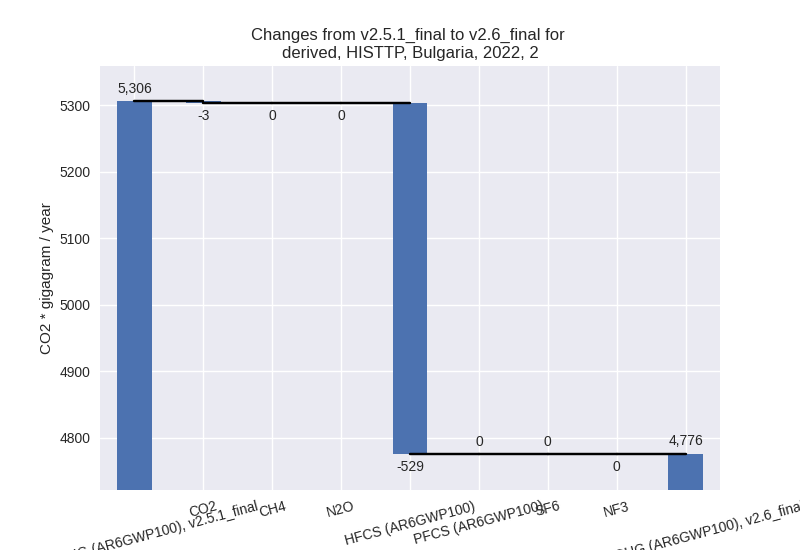
- M.AG: Total sectoral emissions in 2022 are 6601.42 Gg CO2 / year which is 10.3% of M.0.EL emissions. 2022 Emissions have changed by 0.0% (0.00 Gg CO2 / year). 1990-2022 Emissions have changed by 0.0% (0.00 Gg CO2 / year).
- 4: Total sectoral emissions in 2022 are 5957.48 Gg
CO2 / year which is 9.3% of M.0.EL emissions. 2022 Emissions have
changed by 9.0% (489.70 Gg CO2 /
year). 1990-2022 Emissions have changed by 0.8% (56.98 Gg CO2 / year). For 2022 the
changes per gas
are:
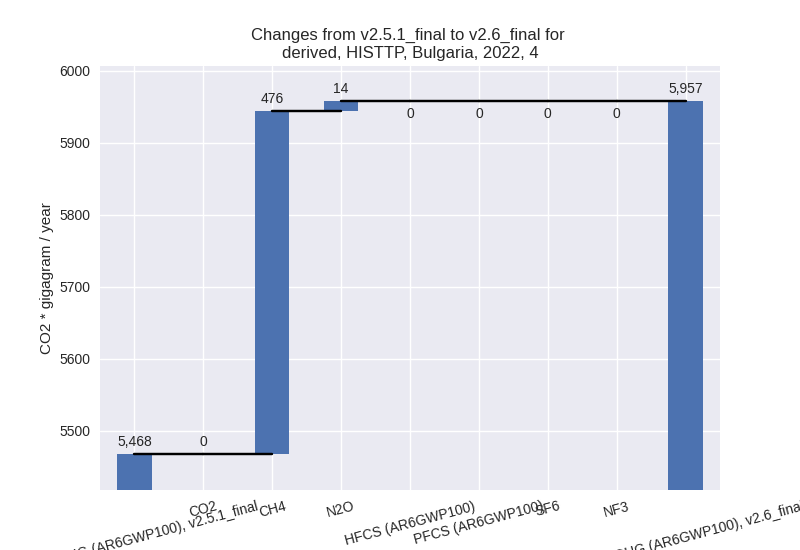
- 5: Total sectoral emissions in 2022 are 158.13 Gg
CO2 / year which is 0.2% of M.0.EL emissions. 2022 Emissions have
changed by 11.2% (15.93 Gg CO2 /
year). 1990-2022 Emissions have changed by 1.9% (3.99 Gg CO2 / year). For 2022 the
changes per gas
are:
